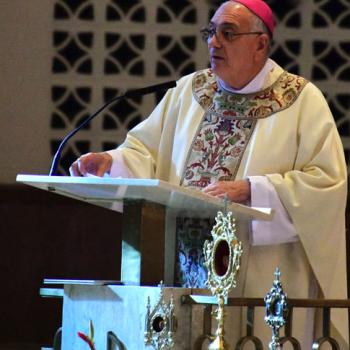Elizabeth Scalia has some clear-eyed, concrete ideas:
We feel lost, but we mustn’t. God is in this moment, just as surely as he was in the moment of Christ’s arrest, and Peter’s denial, and the Crucifixion, and Judas’ death.
Consider this: awful, untenable things have happened and time is a construct. To all of the unjust, horrific, and bloody tortures of those days of fear and passion in Jerusalem are merged our present troubles. Eventually, but not in three days, there will again be glory.
However, we do not have the Apostles’ chance to hide in fear. Our ordeal will be long—think in terms of decades, not years—and our need for real action, both individually and as a Church, is most urgent. Let us begin, right now, to take practical actions, and ponder how to bring them even further. We can start here:
-
Speak up! If you know something, say something. Access local law enforcement if possible; seek a diocesan investigation. Anyone who has ever been abused will tell that silence abets it. Loving the Church too much to see it scandalized by revealing what you know? Honey, that ship has sailed. If your child is being abused, you do not “hide” it for the child’s sake. You validate the child’s importance, and demonstrate your love by going after the predator.
-
Appeal to the Holy Father: This week a group of prominent young Catholics signed an open letter to Rome begging for exposure, redress, and transparency. Circulate similar calls within your parish and diocese and send them to your bishop and to Rome. Any solution to our situation must be initiated through Rome. Request that Pope Francis appoint an investigator, and that this appointee create commissions to examine the realities of how and where our leadership have sinned, and that those commissions be led by faithful and agenda-free lay people of varying gifts, from canon lawyers to insightful moms and dads, for the sake of transparency.
-
Begin a real dialogue with each other about what seminary policies, no matter how well-intentioned, have not only failed but have perhaps fed and exacerbated a corrupt clerical culture. Be willing to listen to each other without a knee-jerk digging in of heels, remembering that Christ often calls surprising and confounding vessels to do his will, whatever we think of it.
-
Request that layfolk, priests, and religious be appointed, in every deanery and diocese, to participate in investigatory panels able to look into accusations and make public recommendations for action to their bishops. Ensure that every seminary has a screening and evaluation process for future priests that includes a similar body.
Those are for starters. She has much more to say, and even more advice on how we can help. Read it all. And pass it on.













